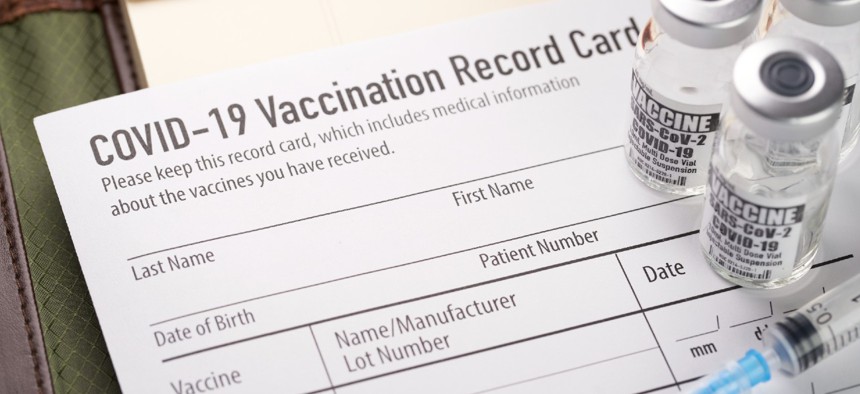
Bill Oxford / iStock.com
New FAQs on Vaccine Attestation and Testing Include Onsite Contractors
Those who provide false information on their vaccination form could be removed from government work.
Onsite federal contractors who provide false information on their vaccination form could be removed from contracts, according to new information the Biden administration released on Friday on the vaccination attestation process for onsite contractors as well as coronavirus testing for those who do not get vaccinated.
President Biden announced on July 29 that all federal employees and onsite contractors will be asked to attest to their vaccine status and if they do not attest to being fully vaccinated then they will have to wear a mask, regardless of their location; maintain a social distance from others at work; comply with weekly or twice weekly coronavirus testing; and be limited on official travel.
“I’m directing my administration to take steps to apply similar standards to all federal contractors,” said Biden. “If you want to do business with the federal government, get your workers vaccinated.” The president also directed the Defense Department to look into requiring the coronavirus vaccine as one of the vaccinations for military service members. On the same day the administration’s Safer Federal Workforce Task Force posted new 7-page workplace safety guidance to supplement the announcement. The new guidance the task force released on Friday covers vaccinations, labor relations and local conditions in a frequently asked questions format.
“Agencies should provide onsite contractors with the certification of vaccination form when they enter a federal building or federally controlled indoor worksite,” the guidance stated. The form has a line that says, “I understand that if I am a federal employee or contractor, making a false statement on this form could result in additional administrative action including an adverse personnel action up to and including removal from my position or removal from a contract.”
Unless agencies already have existing records collection systems that allow them to gather information on contractors, agencies must direct onsite contractors to complete the form and keep it with them while they are on federal properties.
If onsite contractors are not fully vaccinated or refuse to share their vaccination status, they “will either be enrolled in the agency’s testing program or required to show proof of a negative COVID-19 test result from within the previous three days before entry to a federal building or federally controlled indoor worksite.” Agencies are allowed to choose what type of COVID-19 tests visitors or onsite contractors can show as long as they are approved by the Food and Drug Administration.
White House Press Secretary Jen Psaki said on Thursday the costs for tests for employees will vary by agency and “I certainly think it's going to be covered by existing funds and existing budgets of each agency, but it's not one federal pot.” The White House has not said explicitly yet if the federal government will pay for onsite contractors’s tests.
The task force said any new public health requirements imposed by localities “should be followed by federal employees and onsite contractors, in federal buildings, in federally controlled indoor worksites, and on federal lands within that locality.”
Ahead of Friday’s release, experts raised questions that are still not answered.
David Berteau, president and CEO of the Professional Services Council, which represents over 400 companies that contract with the federal government, said “there’s no technical definition on what’s an onsite contractor,” on Government Matters on Tuesday.
Posi Oshinowo, special counsel at the law firm Wiley Rein, pointed out in an interview with Government Executive, “you could be a contractor that works with four different agencies and have to do four different things,” so it isn’t clear what those individuals will have to do.
Guy Brenner, a partner at the law firm Proskauer Rose LLP who leads the labor and employment law practice and government contractor compliance group, told Government Executive “it’s not clear what [Biden] intended” when he made comments about expanding vaccine attestation for the entire federal contracting workforce.
Asked if there could be legal challenges, Brenner noted that in June a federal judge in Texas upheld a vaccine mandate for employees of a hospital system. Also, last month, another federal judge ruled that Indiana University can require its students and faculty to show proof of their vaccinations before coming onto campus this fall.
Additionally, the Justice Department made public a legal opinion on July 26 that said public and private entities may require vaccinations, even if the vaccines only have emergency use authorization from the FDA.
“This is America, so there very well could be a lawsuit, but I think given that it’s not an absolute mandate and given the health guidance out there, it would seem that it would be a long-shot,” Brenner told Government Executive.
Erin Schilling and Jack Blum, shareholder and associate, respectively, from the law firm Polsinelli PC, wrote in a post last week that federal contractors with onsite workers should start “immediately preparing to ensure their personnel comply with the new requirements.” Since the developments are changing quickly and could involve complexities with the Americans with Disabilities Act, Genetic Information Non-Discrimination Act and other laws, “contractors should consult with counsel about these requirements.”
Following the release of the new guidance, Government Executive asked OMB about the remaining questions for contractors. An OMB official said, "Today’s guidance sets forth a robust process for ensuring that onsite contractors are following proper safety protocols.”
Update: This article has been updated with a comment from OMB.







